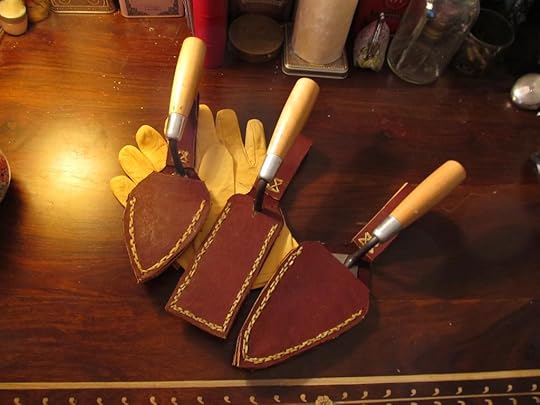M.R. Graham's Blog, page 17
February 2, 2014
4 Writing “Rules” That Aren’t.

Courtesy of kristja
The internet is rife with “This is how to write” articles, and they’re all useful, if you know how to use them.
The problem is that they are presented as lists of hard-and-fast rules, and the most important rule of any expressive craft is that there are no hard-and-fast rules. Like the Pirate Code, writing rules must be more like guidelines, especially now that large publishing houses are retreating from the forefront of the industry and readers are getting to decide what has a chance to sell.
1) Passive Voice
Never, ever, ever use passive voice, right? It makes your writing drag. The reader can find it confusing. It serves no purpose.
Wrong. Very wrong. Language evolves much more quickly and efficiently than life, and purposeless features don’t stick around long. If passive voice wasn’t needed, it wouldn’t exist. The truth is that the passive voice has a very specific function: it calls attention to the object of the action. It tells you which player is important, because the player doing something isn’t always the important one. In storytelling, it can also add an element of suspense, as it makes you wait to find out who is performing the action.
Gina was murdered!
This is how you would usually hear this kind of sentence in conversation. It’s obvious that we know who Gina is, possibly care about her, and she is who we’re talking about. Need more information?
Paul murdered Gina!
Someone else has taken over the sentence. We’re not talking about Gina anymore; we’re talking about Paul. If we want the attention on Paul, that’s well and good, but if we’re still talking about Gina, this is more likely to confuse the reader than passive voice.
Gina was murdered… by Paul!
There we go. Best of both worlds. Now Gina is our focus, and we know whodunit. As an added bonus, we have to wait a full four words and an ellipsis to find out whodunit, building the tension that much further.
2) Adverbs
Stay away from adverbs. They drag down your verbs. Always pick a verb that says what you want it to say without any further modification. In fact, search your document for “-ly” and delete every instance you find.
Bull.
Like the passive voice, adverbs wouldn’t exist if the language didn’t need them. Does every verb need a modifier? Absolutely not. But to read some of these advice columns, you could be excused for believing that even one adverb can ruin your novel. So what’s the limit? One per page? One per chapter? If you’ve got an adverb following every single instance of the word “said,” you’ve probably got a problem, but you can laugh merrily or wickedly or bitterly or ruefully, and there simply isn’t a variation of “to laugh” for each of those. Personally, I hate the word “chortle.” Laughing gaily is better than chortling.
That is to say, you know what you’re trying to convey. If hunting for a verb to convey it takes too long, or if you find one, but it sounds stupid, just use the damn adverb.
3) Action and Description
Action, action, action! No one wants to be bombarded with descriptions or characters’ thoughts. More verbs, simpler verbs. If you have to choose between advancing the plot and developing the scene, choose the plot. Always.
Actually, no. Researchers at Stony Brook University found a positive correlation between amount of descriptive language in a novel and that novel’s success. (Yes, that’s the Daily Mail, but it’s a good summary of the study that was conducted.) Readers want to see the character and the scene. The human brain does not interact with the world as a long string of actions; it takes in details, snapshots. It sees everything in the room, decides which things are important, and takes note of those. That becomes the author’s job, to include everything important and leave out the rest. Chekhov’s gun be damned, if there is a gun on the wall, and it makes a character nervous, it has served its purpose. It need never be mentioned again, because establishing the atmosphere is valid.
Do I think a modern Moby Dick would do very well on Amazon? Pages and pages of admiring the sea? No, not really. But look at Rebecca, by Daphne du Maurier; it wouldn’t be nearly as eerie without the attention paid to the house. The house is, to some extent, the point of the book, almost a character in its own right, and it needs those adjectives. Better yet, look at Twilight. Would Twilight have done nearly as well if we didn’t all know poor Edward from every angle in excruciating detail? Probably not. It did nothing to advance the plot, but it was necessary to make the point Meyer wanted to make.
4) Show, Don’t Tell
First of all, this piece of advice flies around writing forums like cat gifs on Facebook, and I dare you, the next time it’s thrown at you, to ask the suggester to give you an example specific to your writing. The vast majority of people sneezing “Show, don’t tell” at you have no idea what it means. This is mostly because it doesn’t really mean anything. They might offer up that old ”Don’t tell me the moon is shining; show me the glint of light on broken glass” bit, but that doesn’t really mean anything, either.
“Show, don’t tell” is abstract, and not universally applicable. Personally, I think it applies to prologues and the like; I prefer background information to be embedded in conversation or brief flashbacks, because it’s boring to have a huge history lesson dumped on you at the beginning. But then you have stories that just don’t make sense without some telling. Consider Galadriel’s voiceover at the beginning of the Fellowship of the Ring film. It was brief, to the point, and elegantly delivered, but it was undeniably telling. And that was fine.
Then you have emotion. I get a lot of “Show, don’t tell” in response to talking about emotions. In some cases, I understand this.
His pulse pounded furiously in his ears sounds a lot better than He was furious. (Hey, adverbs!)
But if you’re writing in first person, which is the narrator more likely to give you? If I’m furious, I’m more likely to scream one well-chosen word than “MY PULSE IS POUNDING FURIOUSLY IN MY EARS.” Even remembering a moment of fury, “I was furious” sounds much more natural, because rage interferes with observation. If you’re focused on your emotion, you probably have no idea what your pulse is doing.
In Summary:
Use your own good judgement. You know what you’re trying to say. If you’ve done your homework, and you know the purpose behind the language, you can decide for yourself what kind of language to use. Artificial restrictions are just that – artificial and restricting. Read the advice, consider it carefully, and accept or reject it as you think necessary. Give your work to someone you trust to respect both your vision and your integrity, someone who will point out specific problems and give you specific advice on how to fix them, not make blanket statements.
Am I saying to write clunky crap and listen to no one but yourself? Of course not. I’m saying know your craft, know your idea, and know your language. Don’t overdo it with the description, the adverbs, the passive voice, the telling. Don’t weigh down your writing. But these are tools, not taboos. Don’t be afraid to use them when you need them.
BONUS) Draft, Revise, Draft, Revise, Draft, Revise, Draft, Revise, Draft, Revise ad nauseam
Augh. No. As much as I admire people who can sit down and pump out a first draft in its entirety, then sit down and write the damn thing again, I can’t. And a lot of other people can’t, either. This is not the only way.
You know yourself best. You know how your brain functions. Me, I get stuck. I can’t get the next sentence out, and no amount of Butt In Chair Hands On Keyboard will fix that. My options are getting up and going to do something else or editing. I choose editing. It is not a sin to edit an incomplete draft. For me, going back and editing helps get me back into the flow, remember where I was going next, renew my feel for my own language. It takes longer for me to write the end, but I don’t think it really takes any longer to build a finished product.


February 1, 2014
Knife song – a poem
Remember that little human
boy who couldn’t read aloud -
who couldn’t hold a pen
because his slick corn oil skin
kept sliding past itself?
Boy, oh, boy.
And he was born a hundred
years too late for his cowboy
dreams. He rides herd on the
maybes and the somedays.
He sang a knife song – one
that sliced up the rigid spines
of teachers and parents alike
and parted them before him
like God-spoken seas.
Deft elision somewhere between
his teeth and tongue, lyrical, his
words in other men’s mouths.
Knife song honed with lime,
polished with manteca.


January 31, 2014
Pirate Moon – a poem
A bloody moon rose, hungry, through the mist
to wash his crimson glow across the waves
and froth the surging whitecaps with the kiss
that sent ten thousand sailors to their graves.
Beneath that vicious moon, a sail was set –
as was the fate of some poor, hapless crew
oblivious to the impending threat
that drifted ever closer through the blue.
The moon smiled sweetly, bathing naked steel,
as cannon shuddered through the velvet night
to rend the sodden trader, hull and keel
and put an end to her frenetic flight.
The captain’s grin shone redder than his sword
As he o’ersaw the booty brought aboard.
Inspired by the ‘supermoon’ of May, 2012


January 27, 2014
Look what I made!
Trowel sheaths! I figured that, while I’m searching for an archaeological society in my location, I may as well be working on a way to carry my trowels in style. I’d had them rolled up in a crummy towel for quite a while, which was starting to become unacceptable. The sheaths aren’t quite finished – they’re rough around the edges and will require the application of a good belt sander and buffer, and I’m planning to stamp (or burn, to avoid having to dismantle them) my initials into each.



January 26, 2014
Morning Verse – a poem
The morning makes me reckless
with the smell of coffee curling
through my veins in electric
tendrils,
and the pen betwixt my fingertips
shooting feelers through my brain,
and a single dying star
burning in the dawn-green
East.
The morning makes me restless
with the promise of the day
and the breath of open windows
and the smooth relief of
ink;
so in the morning, like a child
celebrating life
I turn my words in dances.


January 25, 2014
Holmesku – a poem
The man with the pipe
sees only the obvious
Lestrade, you moron
Something that appeared one day in the margin of my notebook. I realized later that it could be diced into a haiku.


January 24, 2014
Rebecca – a poem
Tribute to Daphne du Maurier’s gothic novel of the same name.
The rustle of her ballgown,
her footsteps in the hall,
the scent of white azalea
says Rebecca’s come to call.
She lingers in the valley,
and on the twilit stair;
she drifts unseen and silent,
but I know Rebecca’s there.
She was in the watching portraits -
she haunted me, and then
she danced in the inferno
with a whispered Je reviens…


January 23, 2014
The Sisters – a poem
i
Two sisters sat on the edge of a cliff –
and one was old, and one was young
and their mother was not yet born.
They watched the sea below their feet.
The waves chewed at the rocks
as they had built the cliff through ages,
and green weeds flowed with the tide
like the sisters’ hair on the wind.
The sisters sat for many hours,
their fingers twined with strands of yellow grass,
their eyes like chips of ocean glass,
fixed on the far horizon.
Without a word, they sang to each other
and rivalled and warred in silence
as siblings do
without a real reason to fight.
And the grass became a violin
beneath the elder’s hands.
Her pizzicato challenge lost itself
somewhere between Dover and Calais.
The younger never heard it,
trapped as she was in a book
of her own invention
with half a reality against its spine.
So they stayed, forevers in the hours,
inside an opal fog, so thick they could see everything
except one another,
but no eyes were needed for that.
ii
Two sisters sat on the edge of a cliff –
and one was old, and one was young
and their mother was not yet born.
They watched the sea below their feet.
Conjugating the tones of fortune,
it slipped their minds to turn around
and check on the declensions.
Amo amas amat, mittimus mittitis mittunt
Under the angles of the clouds
but above the drop of the cliff, something got stuck,
and two sisters sat alone
amidst the swarms of tourists.
Diutissime, something something
and a subjunctive of some sort, yes?
But after a moment, they lost the beat
and leaned against one another’s shoulders for protection.
iii
Three sisters sat on the edge of a cliff –
and one was old, and one was young
and the other was not yet born.
They watched the sea below their feet.
And the endless seas incarnadine
watched right back.


January 22, 2014
A small explanation.
Why the sudden poetry blast?
Simply put: because it’s there.
I’ve lost my blogging motivation. I have absolutely no ideas for posts, and no idea what to do to get back in the swing. What I do have, however, is a huge pile of journals full of poems and a Facebook page that proclaims me a poet, despite my severe lack of internet-available poetry. The latter struck me as a pretty decent solution to the former.
Daily poetry seems a bit excessive, though, so I may dial back to Monday-Wednesday-Friday or some other similarly staggered schedule.


January 21, 2014
Insert Title_1 – a poem
We, the petty,
we, the bourgeois,
poring over mirrors of reflected, collected verse,
only we could drown
in the shallow pools of our own desires.
Self-worth and efficacy distort, distend,
dilate.
Our longing sighs inflate
gauzy bladders, diaphanous,
and we fancy them substantial because they are large -
(We say much the same of our philanthropy.)
- seeking no synonyms,
though “bloated” comes to mind.
A pseudonym can shelter
the sodden intellect, emaciated,
denigrated by false modesties.
How quaint.
How deep, the brainy poet
who breathes his own despite
behind alabaster walls,
sherry perched atop whalebone fingers,
sloshing like the contents of his skull.
Poseur.





